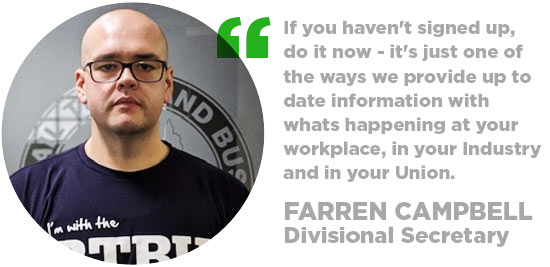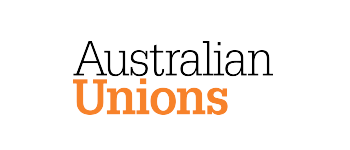Learning from our near-death experience with Aurizon
***Below is the speech given by RTBU National Organiser Leanne Holmes on behalf of RTBU National Secretary Bob Nanva at one of the delegates’ workshops this week.***
Good afternoon everyone.
When the rail freight giant Aurizon first announced in 2014 that it was applying to the Fair Work Commission to terminate twelve enterprise agreements with its workforce it was seen as an an audacious ploy, a stunt, to punish unions by dragging them through expensive and unnecessary legal proceedings.
In fact, an article in the Financial Review at the time – by one of Aurizon’s chief media boosters – stated that Aurizon was “unlikely to win”, but winning wasn’t “the point” because real objective was to “raise the temperature under the unions”.
In other words, not even Aurizon thought that it was possible to terminate an agreement and go back to the Award, just by snapping your fingers.
So if it the Aurizon case was just a tactic, what the hell happened?
What happened was we ran into former Fair Work Commissioner Vice President Graeme Watson.
The same Graeme Watson who was a partner at Freehills, who represented Rio Tinto in disputes with unions, before being appointed to the Fair Work Commission by John Howard.
The same Graeme Watson who, as a Commissioner, has argued against pay rises for disability sector workers, and who led the bench in ruling in favour of Qantas in the 2012 Qantas dispute.
Aurizon’s strategy was to use a poorly-defined clause in the Act that allowed for the agreements to be terminating if it was in the public interest.
As well all know, the Commission surprised everyone by agreeing with the company’s argument that it was in the “public interest” for Aurizon to slash its operating costs and to become more “competitive”.
This was despite the fact that Aurizon’s half-yearly profit at the end of last year was a staggering $307 million, and despite the fact that Aurizon already had around 70-75 per cent of the coal freight market in Queensland.
Effectively, the Commission decided that the company’s interest and the public interest were the same thing.
As a result of that decision, Aurizon were forced to renegotiate their agreements from the starting point of the Award safety net … rather than starting from the existing agreement.
For our members, going back to the award meant losing:
- up to $20,000 in pay;
- job security provisions;
- and a host of negotiated conditions, including maternity leave.
At the time, we recognised that rail workers were the canary in the IR coal mine.
We said if this can happen to 5,000 workers at Aurizon, it could happen to anyone.
So we fought back.
First of all we appealed the decision. We told our members that we would use every legal lever available to use, and we did.
But we knew that the appeal would be a long shot, so used the decision as a opportunity to motivate our members.
We put our organising principles into practice -anger, hope, action.
We started a campaign targeting the CEO of Aurizon, Lance Hockridge, the highly-paid executive who was raking in a million dollar salary while attacking the pay and conditions of his employees.
Our catch cry was “No chance Lance, our EBA is here to stay.”
By getting the message out to our members about the injustice of this attack on their livelihoods we were able to get their attention, and get them angry.
We used the injustice of the decision, and the shameless audacity of the company, to motivate our members, and then we gave them an opportunity to channel that anger into action by staging a series of industrial actions.
We walked off the job.
Then we kept management guessing about whether we would walk off the job or not.
We ran a relentless, negative campaign in the media attacking Lance Hockridge’s record as CEO.
By taking strong action, the unions re-built its relationship with its members, found a new generation of activists among our rank and file.
Aurizon may have won in the court room, but ultimately their stunt backfired.
Because the actions of Fair Work Commission Graeme Watson, bless his cotton socks, ultimately lit the match which set off an industrial fire in the Aurizon workforce.
With a renewed fight on their hands, Aurizon was actually forced to negotiate.
So instead of throwing everyone onto the Award, Aurizon pulled back, and ended up negotiating reasonable pay rise.
We were able to salvage about 95 per cent of our conditions.
Of course, the Aurizon decision has had a profound impact on the IR system, and on our movement.
Every time we go into a negotiation, the employer has a powerful card to play.
But RTBU’s experience at Aurizon show how we all – as a movement – can respond.
Politically, we have to keep fighting to the Turnbull Government every day, because the Turnbull Government is giving these corporate thugs all the ideological cover they need.
At the same time, we have to keep working constructively with the Labor Party so that a future Labor Government fixes the Fair Work Act, and closes the “public interest” loophole once and for all.
In the wake of the Aurizon decision, we launched a national campaign around “truth in bargaining” – so that companies like Aurizon would have to disclose the true state of their books to workers and to the Fair Work Commission during enterprise negotiations.
As a result of our political lobbying, we were able to get a platform amendment through the ALP National Conference, committing a future Labor Government to introducing Truth in Bargaining laws.
But we can’t just rely on the political wing of the labour movement – or anyone else – to solve all our problems for us.
Frankly, we need to lawyer up to fight emboldened employers in the Commission and the courts.
We know the bosses will continue to use every trick in the legal playbook to skewer our wages, conditions and our rights.
Industrially, we have to use the threat of termination to our advantage.
We have to get around every workplace to make sure workers know this could happen to them.
And we have to show that the only way to stop it from happening is through collective action.
Solidarity is everything – and we are always more powerful when we are united, on the shop floor, and as a national movement of workers.
We also have to reach out to the community to get their support for our battles.
Aurizon was able to get away with its argument that higher company profits are in the public interest because too many people were willing to swallow it.
Our task is to educate people about corporate greed, and empower people to stand up and fight back.
Most of all, we need to organise, organise, organise.
So to sum up, there are probably two lessons to be learnt from our experience with the Aurizon termination.
In retrospect, we could have gone earlier and harder with industrial action.
Because it was industrial force, and the power of a united workforce, that finally forced Aurizon back to the table.
The second lesson sounds a bit like a t-shirt slogan: if terminating your EBA doesn’t kill you, it can make you stronger.
Because we’re using our near death experience in Aurizon to fire up our members in other workplaces, and to warn them of the risks of complacency.
Apathy is our enemy, but an active, united and steadfast workforce still has power – no matter what structural road blocks are put in our way by the workplace relations system.
And I hope that our experience with Aurizon can inspire other unions to take one these challenges, and to use them as an opportunity to build their strength – just as we have in the RTBU.



